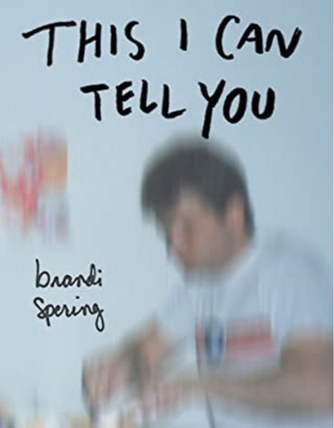This I Can Tell You by Brandi Spering
Micro-Review by Schuyler Peck.
This I Can Tell You is a stunning work of examining childhood, the complexity of memory, and the echoing well of grief, painted jointly through prose and poetry. Brandi Spering invites us into her childhood home, which serves as the epicenter of the book, where we not only sit with her cross-legged on the floor as she explains the history of every room, but we are there with her as it’s built. Every new doorway, a forking branch on the family line, a thread in the placeholder of our hands as she does the work, “where I sew myself together.”
This is storytelling as I’ve missed it. It holds both honesty and enough mystery in either hand. Brandi highlights an integral truth, “the recalling of an event is the making of a memory.” It is clear that each point, each story snippet is thoughtfully paced, so that every event unfolds in its own graceful timing. A welcome factor is added as Brandi allows space to question herself and our reliance on memory, so we receive as genuine of a portrait as the writer can provide. This can be such a difficult recognition to make when memory acts as the conditional thread of a story, but Brandi does so with careful introspection. Reflective of the natural momentum in life of shifting phases, spanning genres, as does This I Can Tell You . It serves as a long glance in the mirror, a scrapbook, a letter of longing, a pointing to a bruise; a eulogy. In a beautiful construction of writing, Brandi offers an opportunity for the reader to be as active in this uncovering of a history as she writes it. It’s been a while since I have guessed the many outcomes of an ending only to be left at the end of a book, still feeling shock in my fingers.
This I Can Tell You is a stunning work of examining childhood, the complexity of memory, and the echoing well of grief, painted jointly through prose and poetry. Brandi Spering invites us into her childhood home, which serves as the epicenter of the book, where we not only sit with her cross-legged on the floor as she explains the history of every room, but we are there with her as it’s built. Every new doorway, a forking branch on the family line, a thread in the placeholder of our hands as she does the work, “where I sew myself together.”
This is storytelling as I’ve missed it. It holds both honesty and enough mystery in either hand. Brandi highlights an integral truth, “the recalling of an event is the making of a memory.” It is clear that each point, each story snippet is thoughtfully paced, so that every event unfolds in its own graceful timing. A welcome factor is added as Brandi allows space to question herself and our reliance on memory, so we receive as genuine of a portrait as the writer can provide. This can be such a difficult recognition to make when memory acts as the conditional thread of a story, but Brandi does so with careful introspection. Reflective of the natural momentum in life of shifting phases, spanning genres, as does This I Can Tell You . It serves as a long glance in the mirror, a scrapbook, a letter of longing, a pointing to a bruise; a eulogy. In a beautiful construction of writing, Brandi offers an opportunity for the reader to be as active in this uncovering of a history as she writes it. It’s been a while since I have guessed the many outcomes of an ending only to be left at the end of a book, still feeling shock in my fingers.
Schuyler Peck is a writer and performer from Portland, Oregon. She is the author of To Hold Your Moss-Covered Heart and A Field of Blooming Bruises, among other titles. Her work can also be found at Crooked Arrow Press, Rising Phoenix Review, JuxtaProse Magazine, Words Dance, Persephone’s Daughters, Thought Catalog, Literary Sexts: Vol. 2, and more. Follow @hiitssky on Instagram.

